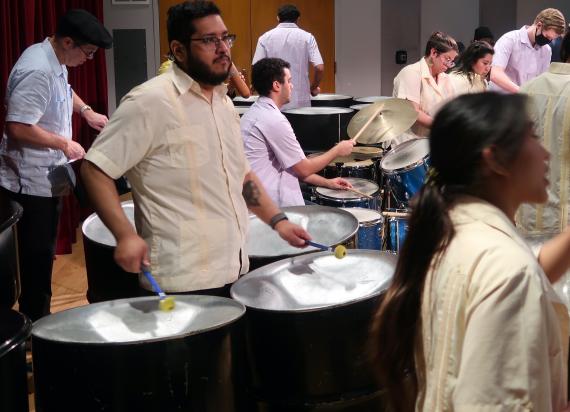The UW Steelband (Shannon Dudley, director) plays a program of feel-good Caribbean music showcasing the versatile sounds of the steel pan.
UW Steelband
Shannon Dudley, director
The UW steelband was founded by Ray Holman, one of the pioneers of steelband music in Trinidad and Tobago, who served as Visiting Artist at the UW School of Music from 1998 to 2000. It is directed by Ethnomusicology professor Shannon Dudley, who has played with steelbands in Trinidad and performs in Seattle with Dingolay. The UW steelband’s repertoire favors Caribbean dance styles, including calypso, soca and salsa, and students focus the rhythmic ensemble that this kind of dance music requires.
Notes on the instruments
The steel pan (sometimes called steel drum) was an innovation made by people of African descent in Trinidad for their carnival percussion ensembles. In the 19th century these ensembles typically featured call and response singing accompanied by drums, but colonial restrictions on drumming compelled them to try different things. Bamboo stamping tubes, known as tamboo bamboo, were popular in carnival during the early 20th century. In the 1930s tamboo bamboo ensembles began incorporating metal containers of various kinds, and at some point it was discovered that the surface of a metal drum could be tuned to different pitches. Musical rivalry between neighborhoods drove the rapid development of this idea into a new melodic instrument by the mid-1940s, and ambitious steel bands learned to play music of all kinds, from calypso to classical music. Today the steel pan is Trinidad and Tobago’s national instrument and steel bands feature many different types of pan, from the low booming basses to high-pitched tenors. Though modern steel pans are crafted by expert tuners who use oscilloscopes to perfect the overtones, most of them are still built from 55-gallon steel barrels that are made for shipping oil, chemicals and other commodities. The steel band’s roots in making music from discarded metal are also reflected in the brake drum, a discarded car part whose ringing clanging rhythm is the heartbeat of the “engine room” alongside drumset, scratcher, congas and other percussion.
Program
(arrangements by Shannon Dudley, except where noted otherwise)
Noche de Luna (c. Oscar Aguirre, arr. Joey Schafer)
Manicero (c. Moises Simón)
What a Wonderful World (c. Thiele and Weiss, arr. David Aarons)
Pan in A Minor (c. Aldwyn Roberts)
Iron Love (c. Nailah Blackman, arr. Kimani Bishop)
Charlotte St. (c. Ray Holman)
Performers:
Kimani Bishop
Damon Chan
Nick Fowler
Galin Hebert
Anita Kumar
Hamsa Shankar
Joseph Schafer
Jacob Schultz
Nicole Setiawan
Guest percussionist: Marisol Berríos-Miranda
Director Biography

Shannon Dudley, professor of Ethnomusicology, holds a PhD from the University of California at Berkeley. He teaches courses that include music of Latin America and the Caribbean, American popular music, Music and Community, Comparative Musicianship and Analysis, and graduate seminars in Ethnomusicology. He also directs the UW steeelband.
Dudley has conducted research in Trinidad and Tobago, focusing on the history and music of steelbands. More recent research interests include the musical geography of Santurce, Puerto Rico, as well as Latino contributions to American popular music. His theoretical interests include nationalism, transculturation, and participatory music practices.
His publications include Carnival Music in Trinidad (Oxford University Press, 2004), as well as Music From Behind the Bridge (Oxford University Press, 2008), a history of Trinidad steelband music, and numerous other articles on Caribbean music, including and "Judging by the Beat: Calypso vs. Soca," Ethnomusicology (1996), and “El Gran Combo, Cortijo, and the Musical Geography of Cangrejos/Santurce, Puerto Rico,” Journal of Caribbean Studies (2008).
Dudley is one of the curators (along with Marisol Berríos-Miranda, and Michelle Habell-Pallan) for American Sabor: Latinos in U.S. Popular Music, a bilingual museum exhibit that opened at the Experience Music Project in Seattle in 2008. Between 2008 and 2015 American Sabor was exhibited in 18 cities in the U.S. and Puerto Rico, first in its original version and later in a smaller version prepared in collaboration with the Smithsonian Institution Traveling Exhibit Service. Published as a book with University of Washington Press in 2018 (americansabor.music.washington.edu), American Sabor won the ARSC's 2019 prize for Best Historical Research in Recorded Rock and Popular Music.
In Seattle Dudley performs on steel pan with Dingolay, and participates in the Seattle Fandango Project (SFP), a community music group that practices son jarocho. He helps to run the Ethnomusicology division's Visiting Artist program, which includes Community Artists in Residence from Mexico, Puerto Rico, and elsewhere who participate in collaborations between local arts organizations and university programs.
